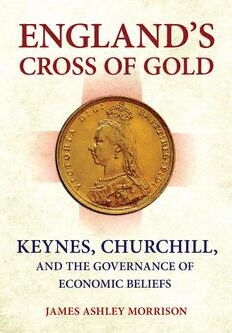
England's Cross of Gold: Keynes, Churchill, and the Governance of Economic Beliefs PDF
Preview England's Cross of Gold: Keynes, Churchill, and the Governance of Economic Beliefs
ENGLAND’S CROSS OF GOLD A volume in the series Cornell Studies in Money Edited by Eric Helleiner and Jonathan Kirshner A list of titles in this series is available at cornellpress.cornell.edu ENGLAND’S CROSS OF GOLD KEYNES, CHURCHILL, AND THE GOVERNANCE OF ECONOMIC BELIEFS James Ashley Morrison CORNELL UNIVERSITY PRESS Ithaca and London Copyright © 2021 by Cornell University All rights reserved. Except for brief quotations in a review, this book, or parts thereof, must not be reproduced in any form without permission in writing from the publisher. For information, address Cornell University Press, Sage House, 512 East State Street, Ithaca, New York 14850. Visit our website at cornellpress.cornell.edu. First published 2021 by Cornell University Press Library of Congress Cataloging-in-Publication Data Names: Morrison, James Ashley, 1980– author. Title: England’s cross of gold : Keynes, Churchill, and the governance of economic beliefs / James Ashley Morrison. Description: Ithaca [New York] : Cornell University Press, 2021. | Series: Cornell studies in money | Includes bibliographical references and index. Identifiers: LCCN 2020046850 (print) | LCCN 2020046851 (ebook) | ISBN 9781501758423 (hardcover) | ISBN 9781501758447 (pdf) | ISBN 9781501758430 (epub) Subjects: LCSH: Gold standard—England—History— 20th century. | Monetary policy—England—History— 20th century. | Great Britain—Economic policy— 1918–1945. Classification: LCC HG950.E54 M85 2021 (print) | LCC HG950.E54 (ebook) | DDC 332.4/222094109042—dc23 LC record available at https://lccn.loc.gov/2020046850 LC ebook record available at https://lccn.loc.gov/2020046851 Cover photo: A Queen Victoria gold sovereign from Victoria’s jubilee year of 1889, courtesy of www.bullionbypost.co.uk. To Maggie Contents Acknowledgments ix Note on Transcription xiii Part One: Introductory 1 1. Genesis and Exodus: The Tragedy of England’s Return to Gold 3 2. The Road to Calvary: From Orthodoxy to Theocracy 18 Part Two: Orthodoxy 39 3. The Cunliffe “Consensus” 41 4. Atop Sinai: More Heat Than Light 47 5. The Golden Calf: The Public Idolize Gold 64 6. Commandments: Defining the Law 94 Part Three: Mythology 109 7. Myths: Theirs and Ours 111 8. Liberalization: Implementing the Orthodoxy 115 9. Who Would Control Capital? 133 10. Keynes’s Revolution 145 Part Four: Theocracy 167 11. Understanding “The Norman Conquest of $4.86” 169 12. Central Bankers as Saviors? 180 viii Contents 13. Indulgence 210 14. Deposition and Coronation 235 15. The Sanhedrin: Churchill’s Trials 248 16. Judgment 268 Part Five: Conclusion 287 17. Faith in History 289 Notes 313 Sources and Bibliography 367 Index 379 Acknowledgments Two decades ago, Richard Boyd prompted me to consider the political consequences of John Locke’s particular understand- ing of money. Pursuing this simple question has proved more engaging and enriching than I could have imagined. It has begot a family of related ques- tions across several fields. First, theoretically, what is the role of “the inven- tion of money” in liberal accounts of the origins and purpose of political society? Next, historically, how did Locke’s rendering of currency as a contract between individuals and between individuals and their sovereign shape the Glorious Revolution, the birth of the Bank of England, and the Great Recoin- age? In the field of International Political Economy, did the anointing of the metallic pound necessitate the mercantilism it engendered—the ineluctable im- perial struggle for precious metals and the draconian controls at home? Nor- matively, were the benefits of an inflexible gold sovereign worth the austere, arbitrary, and asinine policies that often followed? Last, in economics, is it pos- sible to bind the sovereign to a different mast—to a different metric of macro- economic stability beyond just the price of gold in London? Any one of these questions could drive a lifetime of scholarship. As a first step, this book addresses Richard’s original question from the op- posite direction. It asks, What does it take to evolve beyond Locke’s monetary leg- acy? It takes us to that moment one century ago in which the old orthodoxy faced unprecedented challenges, mounted a heroic (although tragic) response, and ultimately collapsed. It retraces the first crucial steps by which Keynes’s revolutionary understanding of money—as a social-political-economic con- struct with a variable relationship to all material objects—became the new orthodoxy. For now, it must remain to explore the full complement of the con- sequences of Mr. Keynes. These past years, the gold standard has been my daily bread. And there are few in my life who have not helped to advance the pursuit of it. I cannot fully express my gratitude in printed words, but I will try to specify the many ways in which others have made this book far better than it would have otherwise been. ix
